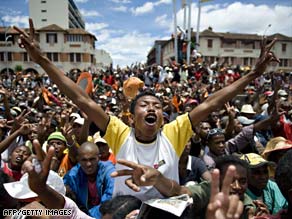
U.N. Secretary-General Ban Ki-moon has urged the leaders of Madagascar to resolve their differences after an anti-government rally a day earlier turned violent and left more than two dozen people dead.
In a statement issued by his spokesperson, Ban deplored the violence and called Sunday on authorities “to urgently initiate a fair process by which those responsible will be brought to justice.” Ban also blamed the “tragedy” on a “lack of restraint on all sides.” “The Secretary-General calls upon all concerned parties to resolve their differences through peaceful and democratic means and through the exercise of responsible leadership,” according to the statement. A police official said the death toll from Saturday’s violence outside the Presidential Palace in the capital city of Antananarivo had risen to 26. More than 80 were injured during the demonstration, officials said. The capital city was quiet as mourners attended a public ceremony for the dead. The violence stemmed from an ongoing dispute over who is in charge of the government.
Don’t Miss
Opposition leader declares himself in charge
Madagascar calms after rioting, deaths
23 killed in protest
Andry Rajoelina, the mayor of Antananarivo, took to the streets one week ago, declaring himself the Indian Ocean island nation’s leader after a week of violence and looting that killed at least 80 people and wounded more than 300. Watch an iReport on the Madagascar violence » But President Marc Ravalomanana has fired him and put someone else in the mayoral job. Rajoelina had called the rally to unveil his new government at the May 13th Plaza, according to Brittany Martin, an American citizen who is a Harvard Fellow and lives in Antananarivo. Martin said the rally was peaceful in the morning hours of Saturday, until gunshots rang out in the afternoon after the protesters marched from the plaza to the palace. She said it was unclear where the shots were coming from. Some media reports blamed foreign mercenaries for the shootings; others said army guards were responsible or that the army was firing at the mercenaries to protect the crowd. Violence in Madagascar began January 26, when protesters stormed state-run television and radio stations in Antananarivo. Hours earlier, the government had shut down a radio station owned by Rajoelina and, weeks ago, had similarly shut down Rajoelina’s television station after it aired an interview with ex-President Didier Ratsiraka. See pictures from last week’s upheaval » Ravalomanana took power in 2001 after ousting Ratsiraka in a tense, hotly contested election. Ratsiraka fled to France afterward. Loyalists blame Ratsiraka’s family members for inciting the recent trouble. Anger has risen in Madagascar, where the World Bank says the average person earns about $320 a year, over reports that Ravalomanana recently bought a $60 million airplane.
Rajoelina has urged supporters to demand the resignation of Ravalomanana and said he planned to take charge until a transition government could be established in the nation off Africa’s southeastern coast. Map » “What we’ve been pushing for is dialogue the whole time,” said Rodney Ford, a spokesman for the U.S. Embassy. He said he had received reports that palace guards used tear gas and shot into the air to try and disperse the crowd.
